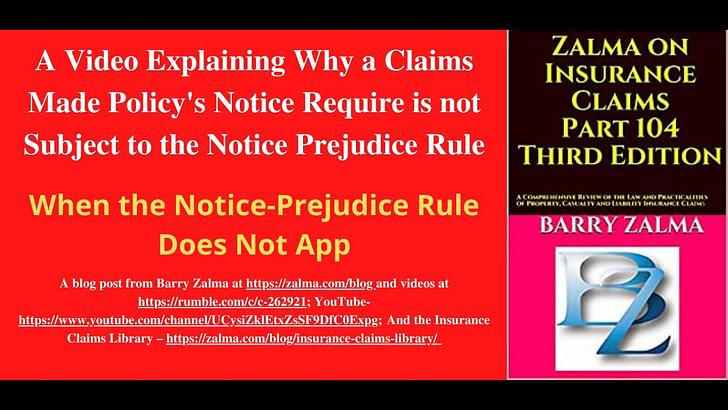A Video Explaining Why a Claims Made Policy’s Notice Require is not Subject to the Notice Prejudice Rule
When the Notice-Prejudice Rule Does Not Apply
Read the full article at https://www.linkedin.com/pulse/when-notice-prejudice-rule-does-apply-barry-zalma-esq-cfe and see the full video at
and https://rumble.com/c/c-26292 and at https://zalma.com/blog plus more than 3850 posts.
Posted on August 31, 2021 by Barry Zalma
See the full video at
and https://rumble.com/c/c-26292
Claims made and claims made and reported policies contain a date certain notice requirement.
Applying the notice-prejudice rule to the date-certain notice requirement in a claims-made policy would alter the parties’ agreed allocation of risk. In short, to excuse late notice in violation of such a requirement would alter a basic term of the insurance contract. Furthermore, it would prevent parties from defining coverage with certainty, no matter how definitive or express the notice requirement. Such a result would significantly diminish the advantages of claims-made policies for both insurers and insureds: insurers could no longer “close the books” on previous policy periods, and policy premiums presumably would rise to account for the risk that an insured might notify the insurer of a claim after the policy period has expired.
Where an insurance policy requires notice of a potential claim, the insured must promptly notify the insurer when the insured reasonably might expect to be the subject of a malpractice claim. This notice requirement operates as a condition precedent to coverage, and to the insurer’s obligation to defend and indemnify. Therefore, absent a valid excuse, the insured’s failure to satisfy the policy’s notice requirements vitiates the policy, and the insurer need not show prejudice in order to assert the defense of noncompliance.
Reading the contract as a whole, the notice provision in the Policy provides a strict reporting requirement. Accordingly, the Court finds that Plaintiffs were required to strictly comply with the notice provision of the contract, and the notice-prejudice rule does not apply to the Policy. Plaintiffs failure to comply with the Policy’s notice provision bars recovery.
© 2021 – Barry Zalma
Barry Zalma, Esq., CFE, now limits his practice to service as an insurance consultant specializing in insurance coverage, insurance claims handling, insurance bad faith and insurance fraud almost equally for insurers and policyholders.
He also serves as an arbitrator or mediator for insurance related disputes. He practiced law in California for more than 44 years as an insurance coverage and claims handling lawyer and more than 54 years in the insurance business.
He is available at http://www.zalma.com and zalma@zalma.com. Mr. Zalma is the first recipient of the first annual Claims Magazine/ACE Legend Award. Over the last 53 years Barry Zalma has dedicated his life to insurance, insurance claims and the need to defeat insurance fraud. He has created the following library of books and other materials to make it possible for insurers and their claims staff to become insurance claims professionals.
Go to the podcast Zalma On Insurance at https://anchor.fm/barry-zalma; Follow Mr. Zalma on Twitter at https://twitter.com/bzalma; Go to Barry Zalma videos at Rumble.com at https://rumble.com/c/c-262921; Go to Barry Zalma on YouTube- https://www.youtube.com/channel/UCysiZklEtxZsSF9DfC0Expg; Go to the Insurance Claims Library – https://zalma.com/blog/insurance-claims-library/ The last two issues of ZIFL are available at https://zalma.com/zalmas-insurance-fraud-letter-2/ podcast now available at https://podcasts.apple.com/us/podcast/zalma-on-insurance/id1509583809?uo=4





